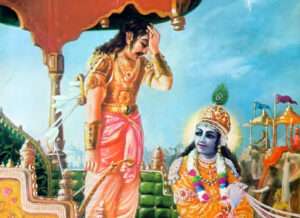The Bhagavad-gita
And at that moment the son of Pandu, sitting on the chariot with the emblem of Hanuman, having seen the mighty enemy army deployed with great tactical wisdom, said to Krishna[1]:
“O infallible, lead me between the two armies so that I can see who, in contempt of their own life, has come to participate in this war.”
Led by Krishna in the middle of the two sides, Arjuna saw his relatives and friends, all armed and ready to die. Foreseeing the tragic fate that awaited most of them, he was overcome with compassion and in a voice trembling with emotion he said:
“Krishna, after seeing so many that I know and are dear to me, I have lost the will to fight. How can I throw my weapons at my friends and relatives, whom I love and respect more than anything else? I believe that nothing good can come from this war. What good are honors and riches if we win them at the cost of other people’s lives? The death of these people would only cause great pain and disorder all over the world and we, who believe we are virtuous, would be stained with sin for eternity. “
Saying these words, Arjuna threw his bow and arrows to the ground, and sat in the chariot, desperate, with an anxious mind and hands shaken by agitation.
At that point he said:
“Oh Govinda, I will not fight.”
Seeing Arjuna depressed because of the compassion he felt for all his loved ones, Krishna said:
“My dear Arjuna, what you have said are only apparently right words. In reality you are a prisoner of a degrading impotence that leads not to elevation but to infamy. Do not give in to this sentimental weakness and rise again.”
[1] What follows is a recapitulation of what is one of the most important philosophical texts ever given to mankind. We recommend our readers to read the Bhagavad-gita As It Is by Sri A.C. Bhaktivedanta Swami Prabhupada.
This is a section of the book “Maha-bharata, Vol. 2”.
To buy the complete book, click above
Post view 618 times




Leave a Reply